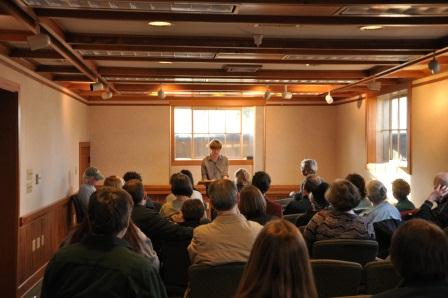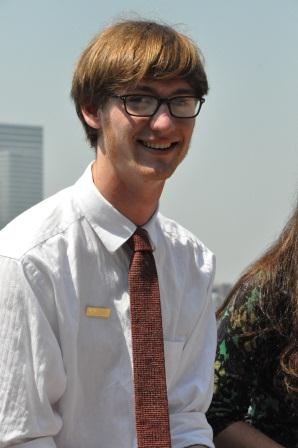Hi! Claire here with another blog post from my series “Poets on Poets” — this time, featuring National Student Poet Miles, who represents the West Coast region. For those who are unfamiliar, the President’s Committee on the Arts and the Humanities and the Institute of Museum and Library Services have partnered with the Alliance for Young Artists & Writers to present the National Students Poets Program, the country’s highest honor for youth poets presenting original work. Each year, five National Student Poets are selected through the prestigious Scholastic Art & Writing Awards for a year of service as poetry ambassadors, each representing a different region of the country. This summer, Miles partnered with Write Around Portland to lead a poetry workshop for adults. He looks forward to attending Harvard University in the fall!

CL: (After getting those awkward “hellos” and “how have you been doing” questions out of the way…) So let’s start with some general questions!
MH: Great.
CL: What was the highlight of your year as a National Student Poet?
MH: Well, I’ve been extraordinarily lucky in the first place, but my highlight would have to be the 2012 Dodge Poetry Festival. I was still doing some soul-searching about the honor, what it meant, and how it would affect me. (He pauses.) It was hard to own up to it, and I felt that I couldn’t own up to it. Dodge was the most overwhelming because I was surrounded by great poetic talents. I was talking to Terrance Hayes and asking him, “What am I doing here?” He responded, saying “you have talent,” to relax, and to trust in my talent and work. He told me, “Don’t try to be someone you’re not.” So, yeah. But after a whole day of stressing, a song just popped into my head—a fully formed song after a whole day of questioning myself. It’s called “Don’t Shoot the Messenger,” and I think it may be one of the best songs I’ve ever written. It’s coming out in my newest album “Empire.” It’s funny, because the inspiration hit at the exact right time.
CL: (Sits quietly in front of computer camera, awed by the awesome talent that is Miles.) Any memorable obstacles or challenges you’d like to share?
MH: [I remember] how I felt at the beginning of the year as the National Student Poet role started. I mean, I was an average guy who suddenly became the face of American youth poetry. The struggle was in trying to balance that dizzying ascent into that echelon and keeping my eyes and internal camera open, so I could retain as much of it as possible.
CL: (Shamelessly) What is your favorite thing about being a National Student Poet?
MH: (Pointedly looks at CL.)
CL: (Meekly) Yes, I know. It’s one of those questions. Don’t hate—or rather, don’t shoot the messenger 😀
MH: There are a great many people who are fantastic writers and poets. The best part of being a National Student Poet was that I was able to meet and talk to some of these people. The best feeling as a writer is 1) when you’re elevated to where you feel like you belong and 2) remain humble. It’s that feeling of camaraderie, especially meeting the other four National Student Poets at events like the Scholastic Art & Writing Awards Ceremony at Carnegie Hall and the National Book Festival, where the NSPP appointment ceremony is held. There is just so much talent, and I love how I got to observe and be a part of it at the same time.
CL: Now, time for those tailored questions! In my first “Poets on Poets” blog post, I talked about how there seems to be a disparity between the number of male and female writers and poets in today’s generation of teens. What’s your commentary?
MH: Well, I have two close friends who are guys and poets and writers; they both graduated this year with me. I attend an arts magnet high school, so there seems to be that “infamous ratio” of maybe three to four girls to every one guy. Girls just seem to be generally more drawn to the arts than guys, I guess. Different forms of art have different amounts of gender bias. For example, in popular music, women are breaking into the scene. A band with a female singer stands out more so than a band with a lead male singer, which I think will change in the coming decades.
CL: So, final question—how can we remedy it?
MH: Historically, the gap between male and female writers wasn’t the case. Writing and poetry was a male-dominated field for centuries, and women writers were a novelty of the 20th century. But there’s been a huge cultural shift, where women are now expected to be more open with feelings and emotions. Though I think poetry is transforming into a more common venue of self-expression regardless of gender.

There you have it! An interview with the National Student Poet Miles: poet, musician, and singer-songwriter extraordinaire! #holla4miles
I hope you’ve learned some interesting things about Miles from his responses, but I want to know what YOU think—How can we bridge that gap between male and female writers? How can we get more boys to submit to the Scholastic Art & Writing Awards? Food for thought, is all. (But really, think about it—and comment! We want to know what YOU think!
And while the final selection of the Class of 2013 National Student Poets is still underway… SAVE THE DATE for the Class of 2013 NSPP Appointment Ceremony Sunday, September 22, 2013 at the National Book Festival! We hope to see you there!
xxCL
